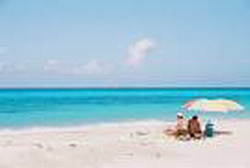US And Cuba Hold Talks On Oil Spill
- Submitted by: admin
- Environment
- international
- 05 / 19 / 2010

The massive oil spill in the Gulf of Mexico has Cuba concerned.
U.S and Cuban officials are holding "working level" talks on how to respond to the massive Deepwater Horizon oil spill that is believed to be dumping some 5,000 barrels of crude a day into the Gulf, two State Department officials told The Associated Press on Wednesday.
The talks add to signs of concern that strong currents could carry the slick far from the site of the spill, possibly threatening the Florida Keys and the pristine white beaches along Cuba's northern coast.
They are also a rare moment of cooperation between two countries locked in conflict for more than half a century.
"I can confirm that they are ongoing and going on at the working level," State Department Spokesman Gordon Duguid told reporters in Washington.
"It is incumbent upon us to inform all of our neighbors, not just the islands, but those countries that could be affected by disasters that happen within our territorial waters."
Another State Department official had previously discussed the talks with The Associated Press on condition of anonymity. Neither would say where the talks were taking place, or what specifically was being discussed.
It was not clear if the U.S. has offered assistance to Havana in the event the oil hits Cuban beaches, or if officials here would accept.
In 2005, then-President Fidel Castro offered the U.S. medical assistance after Hurricane Katrina, including sending Cuban doctors to treat storm victims. The State Department declined the offer.
There was no immediate comment from Cuban authorities on the oil spill talks.
Also Wednesday, the Bahamian government said it would seek to recover costs from BP PLC -- the oil giant that owns a majority interest in the blown well that caused the disaster -- if the crude spill spreads to Bahamian waters and a clean-up operation is required.
"Any money that is spent in a possible clean-up the government would be looking to be reimbursed, and the entire exercise being paid for by BP," said Commander Patrick McNeil, head of the Bahama's National Oil Spill Contingency team.
Relations between the United States and Cuba are at a low, despite optimism that President Barack Obama would usher in a new spirit of cooperation. Still, the two countries have pushed to improve cooperation in dealing with natural disasters and fighting drug trafficking, and have resumed twice-yearly conversations on immigration.
Coast Guard officials from the two countries maintain regular contact on a variety of maritime issues.
Scientists have expressed increasing worry that the oil will get caught up in the so-called loop current, a ribbon of warm water that begins in the Gulf of Mexico and wraps around Florida. Some say the current could even draw the crude through the Keys and then up Florida's Atlantic Coast, where it could wash up around Palm Beach.
Yonggang Liu, a researcher at University of South Florida's College of Marine Science, told AP on Wednesday that if the oil is in the loop current, Cuba's north coast could also be endangered.
"The Florida Strait is very narrow," said Liu. "The local wind effect could bring the oil across the strait to Cuba."
Other USF marine researchers think there's also a possibility that the oil could flow directly to Cuba's northern shore before flowing back up to the Florida Keys.
The island's cash-strapped economy relies heavily on tourists, and most come for a chance to bask in the sun at white-sand beach resorts like Varadero along the northern coast. A loss of any of that income could be devastating, as Cuba is already reeling from the damage done by three 2008 hurricanes, as well as the effects of the global economic crisis.
Cuban state media has reported daily on the oil spill -- and Fidel Castro decried the ecological disaster in an opinion piece as evidence the world's capitalist governments are in thrall to large corporations. But authorities have been remarkably quiet about what effect the spill might have on the island.
Orlando Rey, an Environment Ministry scientist, said on May 5 that the spill did not appear to be a threat to Cuba, despite early reports the oil might get caught up in the loop.
But there has been no update since then, despite the growing alarm coming from U.S. scientific circles.
The government has not responded to a request from The Associated Press for more information, and officials at several Cuban maritime and meteorological institutes have said they have no further information.
Source: cbs4.com/local/Cuba.Gulf.Coast.2.1703289.html
Comments